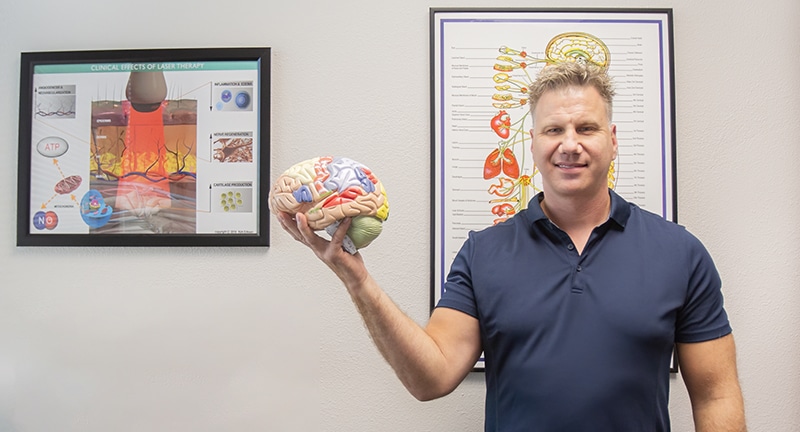By Shay Moser
Photos by Kimberly Carrillo
In our teens and 20s, most of us feel invincible, full of life with endless energy, and rebound quickly from injuries. In our 30s and 40s, our sleep quality typically decreases, causing us to feel more tired from the grind of work and kids. We rely on coffee or caffeinated drinks to get through the day and help with brain fog. If this sounds familiar, it may be a sign of the early stages of cognitive decline that can lead to dementia and Alzheimer’s disease.
“When people get a diagnosis, it’s like a death sentence because the medical community can’t give you a pill to fix the problem — only to slow the progression,” says Dr. Michael Jarembek at Active Care Wellness PLLC in Scottsdale. “It’s like kicking a can down the road to get the same result.”
However, Dr. Jarembek says decline is not inevitable, and his practice helps patients detect early cognitive decline and make lifestyle changes, so they don’t go down that road.
A chiropractor who has served the Valley for more than 20 years, Dr. Jarembek began his journey in functional neurology in 2020 out of intrigue. Little did he know it would open his eyes to the realities of cognitive decline and brain-based disorders. He took a course through the American Functional Neurology Institute where “I got hooked because everything that they were talking about resonated with me,” he says.
Dr. Jarembek learned that the first sign of cognitive decline is decreased focus and concentration, which can progress to anxiety, insomnia, and depression.
“When addressing brain-based disorders, you can’t look and treat only the brain; you have to treat the whole body, especially the gut, or ‘the second brain,’” he explains. “The gut is directly connected to the brain through a superhighway nerve known as the vagus nerve. So, if your gut is healthy, your brain should be healthy, right?
Unfortunately, Dr. Jarembek says 90% of the U.S. population has leaky gut syndrome, an intestinal condition in which a weakening of the intestinal walls allows bacteria and toxins into the bloodstream. These toxins can cause autoimmune disorders in the body.
“Leaky gut is typically caused by the GMO [genetically modified organism] wheat we eat daily,” he says. “Years of eating gluten breaks down the lining in the gut from inflammation, and it will slowly damage the vagus nerve over time.”
He says damage to the vagus nerve causes gut issues, such as bloating, gas, and heartburn. That’s when we often reach for antacids and may notice our brain isn’t as sharp, and we suffer from brain fog and sleep disturbances.
Dr. Jarembek warns that research shows that leaky gut syndrome will also occur six hours after a concussion, head trauma, or car accident. “The leaky gut doesn’t fix itself and progresses, worsening over decades, and, at some point, you can start to suffer with chronic pain syndromes and cognitive disorders like early dementia, Parkinson’s, or Alzheimer’s.”
As Dr. Jarembek assessed himself through his functional neurology program, he discovered at age 45 that he had early-stage cognitive decline. Diagnosing himself early allowed him to absolve his symptoms through a 10-week gut cleanse and doing neurological brain-based exercises and rehab.
“Much of the work comes from the patient,” he says, “from what they put in their mouth to doing the brain-based exercises in the office and at home. The patient must show up.”
Dr. Jarembek put his passion for his work in functional neurology and helping people toward a book. “Enough is Enough: Take Your Health into Your Own Hands” was released in early December. In the Amazon best-selling book, he explains extensively the correlation between the brain, body, and gut.
“There are seven key areas of health that I look at when trying to untangle someone’s chronic issues,” he says. “Throughout my years of practice and study, I’ve learned that any disruption in these areas will cause disconnection and dysfunction, which can turn into chronic problems. When these seven areas are addressed, it unleashes our body’s superpower to heal itself.”
From his functional neurology education, Dr. Jarembek created a thorough neurological exam that evaluates patients’ brains and bodies and determines if he can help them and how long recovery will take. Patients get individual treatment plans based on their exam findings and from extensive blood work through Cyrex Laboratories in Phoenix.
One of the fastest ways Dr. Jarembek checks for brain dysfunction is by looking at eye movement with the RightEye Vision System. Through an eye-tracking exam, it can quantify a number from zero to 100. A score of 90 or more is a healthy brain.
“We monitor and manage patients’ progression as they do home exercises and in-office treatments over time,” he says.
Active Care Wellness also offers Pulse PEMF technology. PEMF, or pulsed electromagnetic fields, infuses the body with magnetic energy at the cellular level to enhance the body’s natural recovery and healing.
“I have about $200,000 in state-of-the-art equipment to help assess and treat the brain and body for optimal healing,” he says.
New patients who sign up for the neurology exam with nerve damage screening will get a free copy of the book. Call Dr. Jarembek today if you’d like him to speak at your next gathering or group event about detecting early cognitive decline and preventing dementia and Parkinson’s and Alzheimer’s diseases.
“Don’t let your age or symptoms fool you,” says Dr. Jarembek. “Decline is avoidable.”
Visit activecarewell.com or call 480-508-0808.
This content is sponsored by Active Care Wellness.





